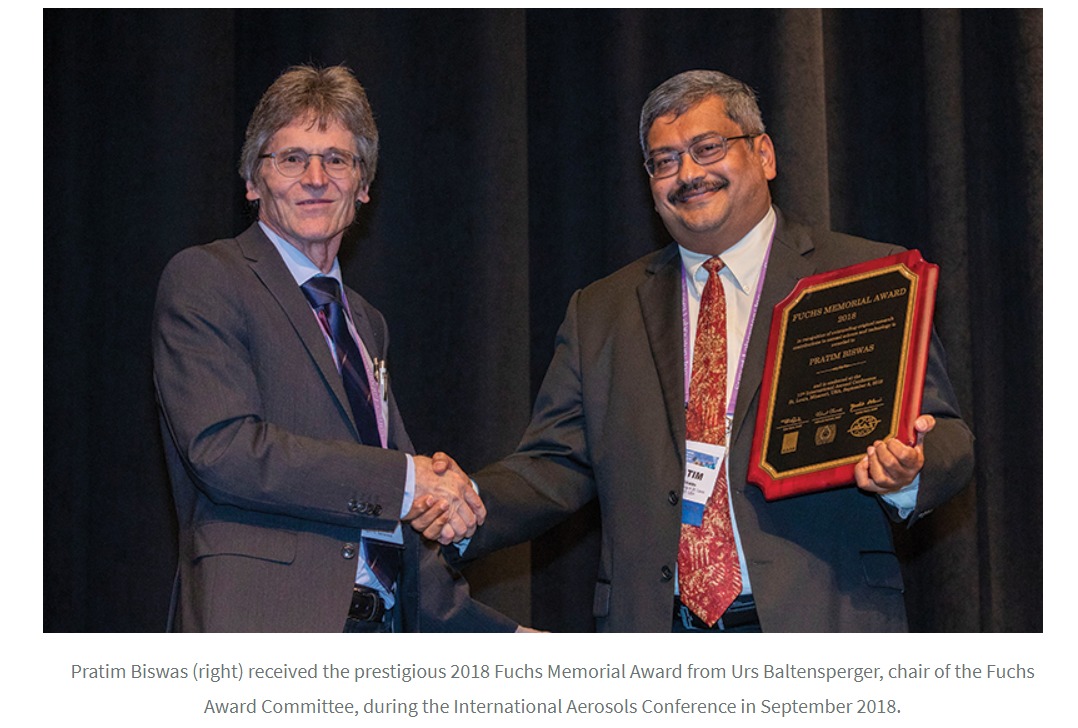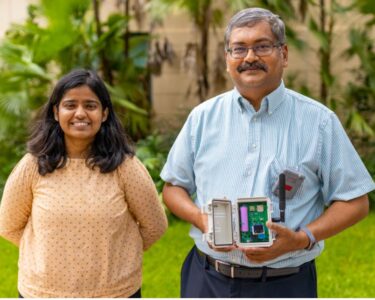By Beth Miller
After recently being elected to the National Academy of Engineering, Pratim Biswas shares the rewards and challenges of his work
Internationally renowned aerosol scientist Pratim Biswas, the Lucy & Stanley Lopata Professor in the McKelvey School of Engineering, was recently elected to the National Academy of Engineering (NAE), considered one of the highest honors in the field of engineering.
Biswas, also assistant vice chancellor of international programs and chair of the Department of Energy, Environmental & Chemical Engineering, holds 10 patents and has spun off two startup companies based on his inventions, including Applied Particle Technology. He has more than 400 refereed journal publications. His work applying aerosol science to energy and environmental nanotechnology, solar energy use, air pollution control, medicine and other areas was recognized in 2018 with the Fuchs Award, the highest honor given worldwide to an aerosol scientist.
Biswas was chosen by his peers in the NAE “for advancing the science of aerosol dynamics and particle removal technologies.” He is one of two McKelvey Engineering faculty in the NAE; the other is Yoram Rudy, the Fred Saigh Distinguished Professor of Engineering in the Department of Biomedical Engineering. Biswas was inducted into the NAE Class of 2019 Oct. 6 in Washington, D.C.
Q. When you came to the U.S. from India with your two suitcases, did you ever imagine that you’d be elected to the National Academy of Engineering?
A. One always has high ambition, but at that stage, I was more focused on earning my PhD. I always wanted to make a difference and a contribution, so this is a good recognition of my efforts. Most of the space in the two suitcases that I brought to this country was taken up by books!
Q. What do you find most challenging about your work?
A. One challenge I face is that while I try to do innovative, impactful work, it takes time for the impact to be realized. I work with young, smart minds — our students — who are so motivated that they want to make a difference right away. Hence, a challenging aspect is to inculcate the values of patience and hard work. I also have responsibilities as the chair of the department, ensuring that I set an example and help the entire department to excel. While there are challenging aspects of my work, I think it is fun and enjoyable.
Q. Tell me about a project or accomplishment that you consider to be the most significant in your career.
A. There are several spanning my career. The overall approach of focusing on a fundamental understanding of aerosol science and engineering, and then applying them to a large number of areas, including some that are quite unique and have never been thought about before. One example is capturing emissions of problematic small particles from combustion systems that are very challenging to trap; by understanding and enhancing charging of small particles and advancing the design of particle capture technology. In addition to these systems being applied on our planet, we will now also need these to be applied in outer space as we enhance exploration of that frontier. The ability to synthesize nanoparticles with controlled size, shape and composition that results in desired functionality has allowed us to develop applications in areas such as solar energy harvesting, nanomedicine for targeted drug delivery, the holy grail of carbon dioxide capture and conversion to value- added chemicals, and efficient nutrient uptake by plants for smart precision agriculture.
These developments and accomplishments have been possible due to work with excellent students and collaborations with colleagues in several other disciplines.
I feel humbled to be selected for each of these awards. It’s a recognition of the work over the years done by past and current students. The recognition by the NAE is special because it’s the entire engineering community in the U.S. that you are selected from.
Read the rest @ https://engineering.wustl.edu/news/magazine/2019-fall/QA-with-Pratim-Biswas.html






